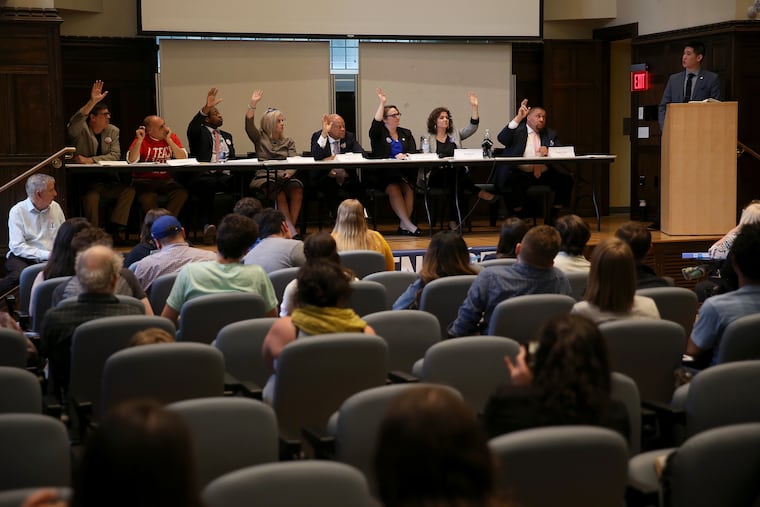Philly city commissioners race 2019: Meet the 13 Democrats — 13! — who want to run elections
Thirteen Democrats want to run Philly’s elections. Here’s where they stand on the issues.

A lot of people want to run Philly’s elections.
In this year’s primary, 14 candidates are vying to be the city’s top elections officials — the largest field in 36 years. All that interest is due in part to increased attention on election and voting issues, an open seat for a job that pays more than $130,000 a year, and recent controversies regarding the office and its operation.
All three Philadelphia city commissioner seats are up for election. One incumbent Democrat is among the 13 running, while the other is retiring. Incumbent Republican Al Schmidt is unopposed.
All the competition is on the Democratic side. By law no party can occupy more than two seats, and in heavily Democratic Philadelphia the two primary winners are almost certain to prevail in November. Schmidt will face any independent or third-party candidates in November for the third seat.
It’s the second-highest number of candidates in the office’s history, tied with 1983 at 14 candidates (11 Democrats, 3 Republicans) and second to 1979 (24 Democrats, 3 Republicans), in the fallout from the effort to recall Mayor Frank L. Rizzo.
To learn more about the candidates, The Inquirer sent questionnaires to all 13 Democrats, receiving responses from 10 of them. (Robin Trent, Warren Bloom, and Annette Thompson did not respond.) The Inquirer also moderated a forum at which eight of the candidates appeared, examined voting histories and campaign-finance records and other public records, and searched candidates’ social-media feeds and websites.
Voting histories
Here is each candidate’s voting history since the May 2006 primary election, according to data from the Pennsylvania Department of State. Moira Bohannon registered in Philadelphia in August 2012, and Kahlil Williams in March 2017, so they do not have vote histories prior to those dates.
How they see the state of elections today
The candidates largely agree on proposals to change how the city’s elections are run, but not on various election-related issues. For example, the two candidates endorsed by the city Democratic Party disagree on whether voter fraud is a problem, with Lisa Deeley saying that for the most part it isn’t and Omar Sabir seeing it as an important threat.
Similarly, Williams believes voter registration deadlines are not much of a threat to elections, while Luigi Borda rated them a top threat.
Where they stand on the issues
Across the country, attempts at electoral reform generally split along partisan lines, with Republicans often focusing on security concerns such as preventing voter fraud — which has been virtually nonexistent — and Democrats focusing on expanding access to the vote.
In recent years especially, Democrats have gotten behind a number of proposals aimed at lowering barriers to registration and casting a ballot. In Pennsylvania, state election law is specific and restrictive, and elections largely continue to run as they have for decades.
So while around two in five voters nationwide today vote by some method other than at the polls — thanks to changes such as expanded voting by mail — in Pennsylvania the vast majority of ballots are cast on Election Day.
Reflecting the nature of the Democratic primary, the candidates at the forum almost unanimously supported a number of proposals, including:
in-person early voting so voters can vote prior to Tuesday of Election Day
no-excuse absentee voting so voters can request mail-in ballots without having to provide a reason
automatic registration so eligible voters are automatically registered at PennDot and other agencies
open primary elections so voters do not need to be registered with a party to vote in its primary
same-day registration so eligible new voters can register on Election Day and cast a ballot
ranked-choice voting in which voters assign candidates as their first-place pick, second-place, etc.
allowing people to vote while in prison
In addition, all the candidates but Deeley said they support making Election Day a holiday, all but Williams said they support lowering the voting age, and only Borda said he supports compulsory voting.
No candidates said they support moving to 100 percent vote by mail.
All candidates said they would be willing to take less than the $131,000 paid to current commissioners. (One of the commissioners, elected as chair, makes more.)
Their priorities
Given the large number of proposals they support, and their many plans for how to improve Philly’s elections, The Inquirer asked candidates at the forum what their top priority will be if elected.
Marwan Kreidie: Voter turnout, trust in commissioners’ office, voting machines.
Luigi Borda: Civic education in schools.
Kahlil Williams: Voter registration and protecting the 2020 election.
Lisa Deeley left the event early.
Dennis Lee: Integrity training for staff and poll workers.
Moira Bohannon: Website overhaul, including information on registration, absentee ballots, voting logistics, accessibility, and multiple languages.
Jen Devor: Election Day administration, including filling poll-worker vacancies.
Omar Sabir: Community outreach and voter turnout.
What they would do in their first year
In The Inquirer questionnaire, the candidates were asked to name one concrete action they would take within their first year.
Jen Devor:
Marwan Kreidie:
Carla Cain:
Luigi Borda:
Dennis Lee:
Lewis Harris Jr.:
Kahlil Williams:
Lisa Deeley:
Moira Bohannon:
Omar Sabir: